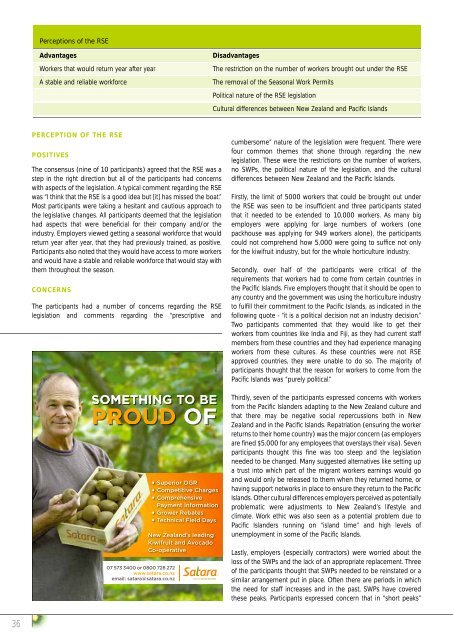Thirsty vines Summer girdling Compost teas Organic marketing The ...
Thirsty vines Summer girdling Compost teas Organic marketing The ...
Thirsty vines Summer girdling Compost teas Organic marketing The ...
Create successful ePaper yourself
Turn your PDF publications into a flip-book with our unique Google optimized e-Paper software.
36<br />
Perceptions of the RSE<br />
Advantages Disadvantages<br />
Workers that would return year after year <strong>The</strong> restriction on the number of workers brought out under the RSE<br />
A stable and reliable workforce <strong>The</strong> removal of the Seasonal Work Permits<br />
PERCEPTION OF THE RSE<br />
POSITIVES<br />
<strong>The</strong> consensus (nine of 10 participants) agreed that the RSE was a<br />
step in the right direction but all of the participants had concerns<br />
with aspects of the legislation. A typical comment regarding the RSE<br />
was “I think that the RSE is a good idea but [it] has missed the boat.”<br />
Most participants were taking a hesitant and cautious approach to<br />
the legislative changes. All participants deemed that the legislation<br />
had aspects that were benefi cial for their company and/or the<br />
industry. Employers viewed getting a seasonal workforce that would<br />
return year after year, that they had previously trained, as positive.<br />
Participants also noted that they would have access to more workers<br />
and would have a stable and reliable workforce that would stay with<br />
them throughout the season.<br />
CONCERNS<br />
<strong>The</strong> participants had a number of concerns regarding the RSE<br />
legislation and comments regarding the “prescriptive and<br />
<br />
<br />
<br />
<br />
<br />
<br />
<br />
<br />
<br />
<br />
<br />
<br />
<br />
<br />
<br />
<br />
<br />
<br />
<br />
<br />
Political nature of the RSE legislation<br />
Cultural differences between New Zealand and Pacifi c Islands<br />
cumbersome” nature of the legislation were frequent. <strong>The</strong>re were<br />
four common themes that shone through regarding the new<br />
legislation. <strong>The</strong>se were the restrictions on the number of workers,<br />
no SWPs, the political nature of the legislation, and the cultural<br />
differences between New Zealand and the Pacifi c Islands.<br />
Firstly, the limit of 5000 workers that could be brought out under<br />
the RSE was seen to be insuffi cient and three participants stated<br />
that it needed to be extended to 10,000 workers. As many big<br />
employers were applying for large numbers of workers (one<br />
packhouse was applying for 949 workers alone), the participants<br />
could not comprehend how 5,000 were going to suffi ce not only<br />
for the kiwifruit industry, but for the whole horticulture industry.<br />
Secondly, over half of the participants were critical of the<br />
requirements that workers had to come from certain countries in<br />
the Pacifi c Islands. Five employers thought that it should be open to<br />
any country and the government was using the horticulture industry<br />
to fulfi ll their commitment to the Pacifi c Islands, as indicated in the<br />
following quote - “it is a political decision not an industry decision.”<br />
Two participants commented that they would like to get their<br />
workers from countries like India and Fiji, as they had current staff<br />
members from these countries and they had experience managing<br />
workers from these cultures. As these countries were not RSE<br />
approved countries, they were unable to do so. <strong>The</strong> majority of<br />
participants thought that the reason for workers to come from the<br />
Pacifi c Islands was “purely political.”<br />
Thirdly, seven of the participants expressed concerns with workers<br />
from the Pacifi c Islanders adapting to the New Zealand culture and<br />
that there may be negative social repercussions both in New<br />
Zealand and in the Pacifi c Islands. Repatriation (ensuring the worker<br />
returns to their home country) was the major concern (as employers<br />
are fi ned $5,000 for any employees that overstays their visa). Seven<br />
participants thought this fi ne was too steep and the legislation<br />
needed to be changed. Many suggested alternatives like setting up<br />
a trust into which part of the migrant workers earnings would go<br />
and would only be released to them when they returned home, or<br />
having support networks in place to ensure they return to the Pacifi c<br />
Islands. Other cultural differences employers perceived as potentially<br />
problematic were adjustments to New Zealand’s lifestyle and<br />
climate. Work ethic was also seen as a potential problem due to<br />
Pacifi c Islanders running on “island time” and high levels of<br />
unemployment in some of the Pacifi c Islands.<br />
Lastly, employers (especially contractors) were worried about the<br />
loss of the SWPs and the lack of an appropriate replacement. Three<br />
of the participants thought that SWPs needed to be reinstated or a<br />
similar arrangement put in place. Often there are periods in which<br />
the need for staff increases and in the past, SWPs have covered<br />
these peaks. Participants expressed concern that in “short peaks”


